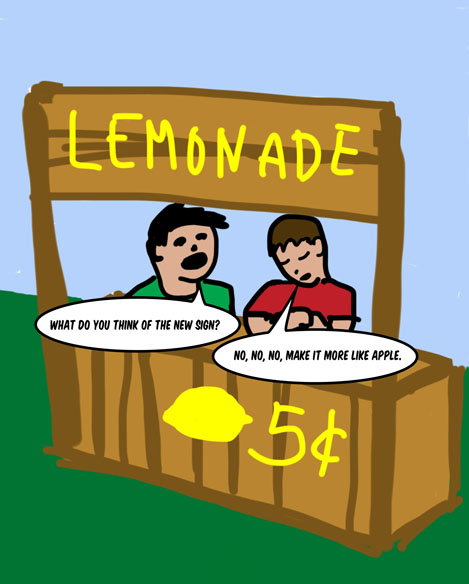
A marketing manager is reviewing social media drafts and ad copy with her boss, a company executive. The executive turns to the marketing manager, places his hands together as if in prayer, makes direct eye contact with her, and stoically says, "No. Make it like Apple." The manager is confused as the executive lightly taps the table with his knuckles on his way out the door, as if to say that his point has been made and nothing more needs to be said; the corporate equivalent of dropping the mic.
As an employee, I've had this idiom tossed at me as well. Apple as a brand means different things to different people; cult-like, expensive, design-lead, slick, innovative, derivative, or simple. Executives often miss the mark of perspective when communicating with their subordinates, and this recent worship of the Apple business model that seems to sweep business meetings tends to be either completely delusional or short-sighted.
I've heard this comparison in the construction industry, food services, and of course tech. Most executives seem to only have a fuzzy grasp of the concept of Apple. They're usually fans of Apple products, but are fairly unfamiliar with the workings of the business, only ever exposed to the final result of years of research, experimentation, and anguish. People often forget that the two Steves bootstrapped the Apple empire from a garage, and didn't exactly dominate the marketplace from the beginning, enduring decades of failure, criticism, and ultimately success.
I hear the use of Apple as a target to hit in terms of messaging and design specifically; when others are trying to emulate the Apple aesthetic. What exactly is the Apple aesthetic, and how does one develop it? Again, it depends on your perspective. Is the Apple aesthetic the ads they run on television, print ads with minimalistic copy, the interactive design of the iTunes music store, or the product design of their hardware? Apple's visual aesthetics actually vary across different channels and mediums, and while it may seem consistent, they are usually tailored through vast amounts of research and validation for the channels these aesthetics will address. The Apple aesthetic is a living, dynamic process; it's user-oriented and develops with its customers.
Product design is what Apple is most known for, and what set them apart for years; making products that are easy and intuitive to use. People tend to think of design as Steve Jobs' obsession with things like rounded corners and typographic idiosyncrasies found in the early Macintosh OS, but those are almost always secondary to functional design, which is something that Apple has excelled at over the last few decades. Functional design is the placement of the power button to make it intuitive to find, nubs placed on the "f" and "j" of keyboards to make finger placement intuitive (not an Apple innovation), or the early Macintosh File System. Apple's innovations developed through practical usage, and items such as rounded corners and white-everything are more a matter of decoration than design. Their products were designed towards their users, sometimes stealing from standards set by Braun (because Apple wanted their computers to be thought of as home appliances), but developed its own voice and identity over time. Again, a living and dynamic process.
Apple's success is really the product of a number of many, many factors. Simplifying the most visible aspects of the business to a single point such as product design, interface design, product engineering, marketing, or vertical market places is shortsighted and possibly dangerous for a business. Emulating one or two aspects of a comprehensive business model is downright ridiculous. It's akin to thinking that your '76 VW bug will perform like a Porsche if it has the same paint.
A good business is one that has it's own core identity and unique value proposition. The value of observing a business like Apple is not to awe in the shine of their end product, but to observe their process and story; make mistakes, perform research, pay attention and design towards your customers. Not Apple's. *drops mic*
